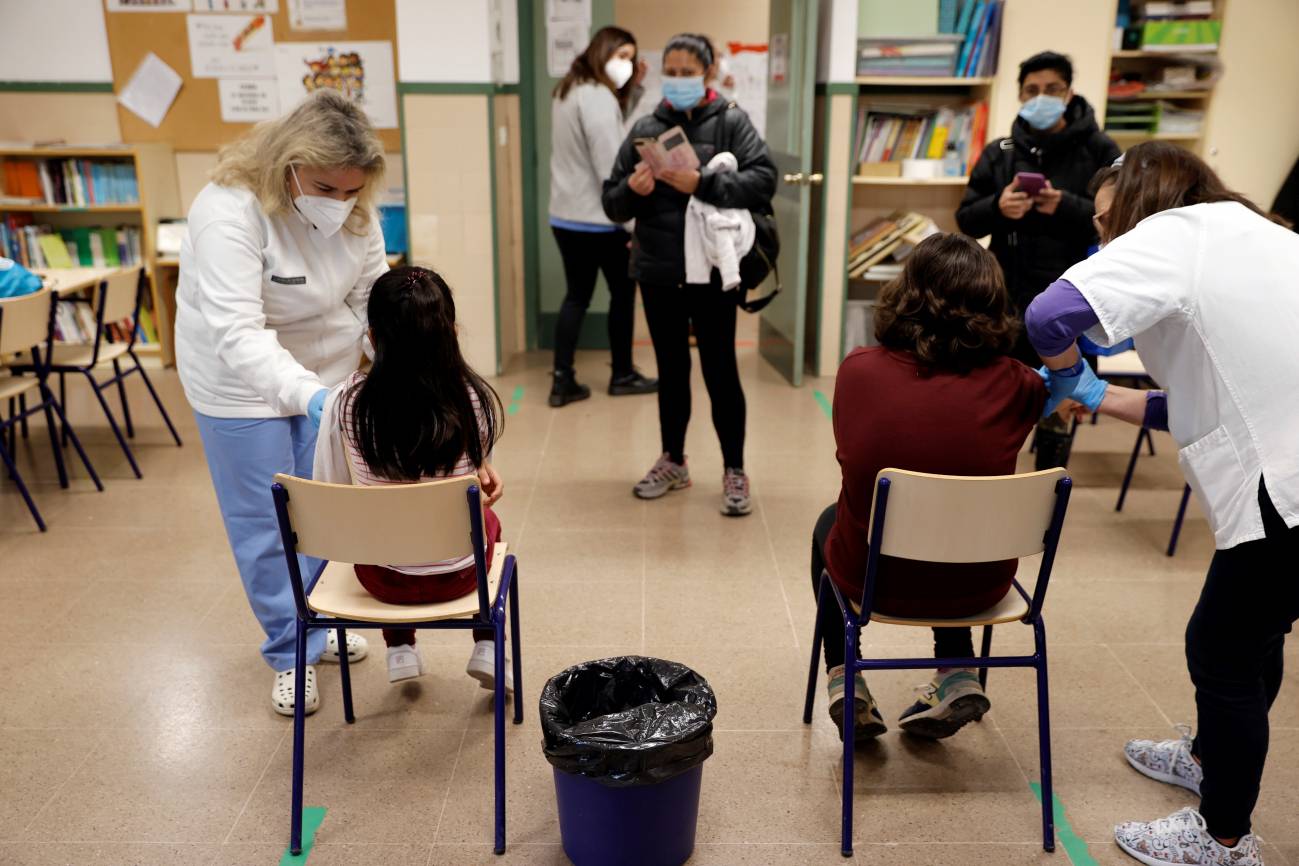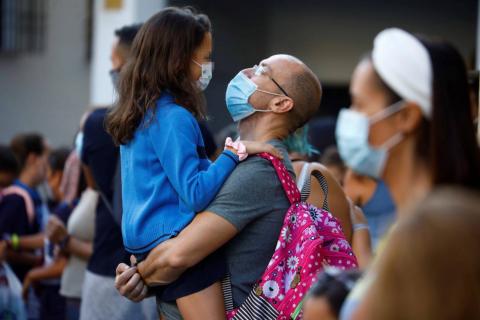1) What do pediatricians say?
The Spanish Association of Pediatrics (AEP) supports the official recommendations on childhood vaccination. The coordinator of its Vaccine Advisory Committee, Francisco Álvarez García, explained the reasons to the Covid Vaccine Media Hub:
- The vaccine "has been shown to be effective (90.7%) and safe."
- Children "have the right to be protected against a disease that, although generally mild" in them, "can be serious". Since the beginning of the pandemic there have been ten deaths in Spain in children under 10 years of age, and some 180 admissions to intensive care -all of them were especially vulnerable due to other underlying pathologies.
- Vaccination contributes to having "safe educational spaces", which psychiatrists have seen during the pandemic "are indispensable for the training and psycho-emotional well-being of children".
- Children make up 10% of the population and their vaccination helps to achieve "group protection, which with the delta variant is 91%".
- "We will also manage to reduce the circulation of SARS-CoV-2 and the emergence of new variants."
2) How much is for them and how much for the community?
Ángel Hernández Merino, member of the Vaccine Advisory Committee of the AEP, explains that "vaccination is recommended because it is expected to bring net benefits to the child and to the community as a whole. This second aspect is not exclusive to this vaccine; the best vaccines benefit the vaccinated and also, in different ways, the unvaccinated".
Spain's Public Health Commission document states: "The transmission role of the child population in SARS-CoV-2 infection seems to be less important compared to the role played by adults". But it admits that "vaccination in the pediatric population would decrease the burden of disease in this group and may decrease transmission in the family environment, in schools and in the community, contributing to the protection of the most vulnerable populations".
3) On what benefit/risk balance has the approval of the vaccine for children been based?
The approval of the Comirnaty vaccine (Pfizer) for children aged 5 to 11 years by the Spanish Medicines Agency (AEMPS) and the European Medicines Agency (EMA) was based on the following risk/benefit analysis: "The clinical trial was conducted under a double-blind design (...). Of the 1,305 minors who received the vaccine, only three developed the disease, compared to 16 of the 663 who received the placebo, showing an efficacy of 90.7%.
"The most frequent adverse reactions identified in minors aged 5 to 11 years (...) are usually mild or moderate and improve within a few days. Therefore, the CHMP has concluded that the benefits of Comirnaty in children aged 5 to 11 years outweigh the risks, especially in those with conditions that increase the risk of severe covid-19."
4) Are we sure they are safe?
The technical data sheet of the Comirnaty vaccine itself -on page 99 the data for the infant dose, one third of the adult dose, are dealt with- reports side effects similar to those of older children: pain at the injection site, fatigue, headache, myalgia, chills, arthralgia and fever and swelling at the injection site.
The AEMPS reminds that "the safety and efficacy of this vaccine, as with all other drugs, will continue to be closely monitored in all age groups once the pediatric vaccine is used in real life."
Angel Hernandez explains to the Vaccine Media Hub the importance of considering these data: "The trials [that led to approval] did not detect serious side effects. This is a minimum basis, but not sufficient, as there may be low-frequency side effects that will only become apparent after use of the vaccine in real-life conditions and in large populations. This has always been the case. However, several million have already been vaccinated in the U.S. and no warning signs have appeared".
5) Has any myocarditis been detected in children?
This is another fact that tips the balance in favor of vaccination. "Vaccination of adolescents has already shown that cases of peri/myocarditis are very rare (less than 1/10,000), and in any case less than those caused by the natural disease itself," says Ángel Hernández. So far, no cases have been detected in trials or in countries that already vaccinate, such as the USA and Israel.
6) What data are available from countries that are already vaccinating children?
The Public Health Commission has taken into account recent data from countries that have already been vaccinating children for weeks: "The United States and Israel, among others, have started to vaccinate children aged 5 to 11 years. Specifically, more than 5 million doses have been administered in the United States (...). While an analysis of the safety of the vaccine after large-scale use and its relevance in real life is not yet available, to date no alarm signals have been generated about the safety of vaccination in these children."
7) Are there children in whom vaccination is NOT recommended?
"There are no groups of children in whom vaccination is not recommended", answers Ángel Hernández.
But there are individual cases in which vaccination is contraindicated: children who have already had a severe allergic reaction (anaphylaxis) or an immediate reaction to a previous dose of the same vaccine, or to some component (active ingredient or excipient). In other words, children with already known allergies.
"Most of these children, who are few in absolute numbers, could be vaccinated after an allergological evaluation and if the high risk of covid persists," adds Hernandez.
8) What about children with allergies?
If they have already had an allergic reaction to a previous dose of the same vaccine, or to any component, vaccination is discouraged without prior allergological evaluation (see 7).
As for children undergoing immunotherapy treatment against allergy (vaccines for desensitization), they can be vaccinated against the covid-19 vaccine normally "as no interference between the two is to be expected", state the AEP and Spain's Ministry of Health.
9) Which children are at very high risk, and whose vaccination is considered a priority?
The Public Health Commission states that "children in "groups at very high risk (Group 7 of the Strategy)" "may be prioritized in childhood vaccination in parallel with the progress of vaccination by age cohorts from oldest to youngest".
This group is defined in detail in the table in Update 5 of the strategy and includes, among others, individuals with hematopoietic stem cell and solid organ transplants, renal replacement therapy (hemodialysis and peritoneal dialysis), oncohematologic disease and certain cancers, and HIV infection with CD4 cells below 200mL.
Fitting into this group, notes Ángel Hernández, are "recipients of immunosuppressive treatments used in non-oncological inflammatory diseases.
The "very high-risk conditions" established in update 9 are also a priority: "The reason is to be able to include congenital or complex chronic diseases, such as some genetic syndromes and other situations that involve a high degree of dependency of the child," explains Hernández. Also "serious neurological diseases and situations of cognitive deficit", as well as morbid obesity.
10) Can children receiving a transplant, undergoing cancer treatment and/or immunosuppressed be vaccinated?
Not only can they be vaccinated, but these children have priority and are also candidates to receive a third dose (see 9).
11) What about children with Down syndrome and other genetically based syndromes?
Children with diseases causing a high degree of dependency have priority (see 9).
12) Why are the two doses in children eight weeks apart, instead of three?
The data sheet of Comirnaty (10 µg) includes the three-week interval because it was the one studied in the clinical trial that served as the basis for its authorization. But the Public Health Commission decided last December 7 to recommend an interval of 8 weeks "to achieve a better immune response and a better safety profile (...). It is well known that the immune response to vaccines is, in general, superior when the second dose is administered with a longer interval, as has been observed in adolescents between 12 and 16 years of age".
The AEP states that "the prolongation of the interval between doses of the Comirnaty vaccine (10 µg) in children 5-11 years of age is probably a wise decision in the current context". The AEP provides reviews of studies with evidence in this regard.
13) Will children in high-risk groups also receive a third dose, like adults?
Yes, the instructions of the Public Health Commission indicate so.
14) Can the vaccine interact (negatively) with any treatment the child is following?
In general, no. "The only exception are treatments with immunosuppressive capacity (cancer, transplants, inflammatory diseases, etc.) in which the response can be suboptimal, but in which vaccination is not only not contraindicated, but is especially indicated", says Ángel Hernández.
15) What if the vaccine against covid coincides with other vaccines in the children's vaccination schedule?
"Covid-19 mRNA vaccines for children can be administered concomitantly with any vaccine, in different anatomical sites", says the Public Health Commission.
16) If the vaccination is in schools, can it be done without parental authorization?
No. A written authorization from the mother, father or guardian must be requested beforehand, says the Public Health Commission.
17) Can children who have passed the covid be vaccinated?
Yes, with a single dose starting four weeks after diagnosis. If infection occurs after the first dose, vaccination will be four weeks after infection, maintaining the eight-week interval from the first dose.




